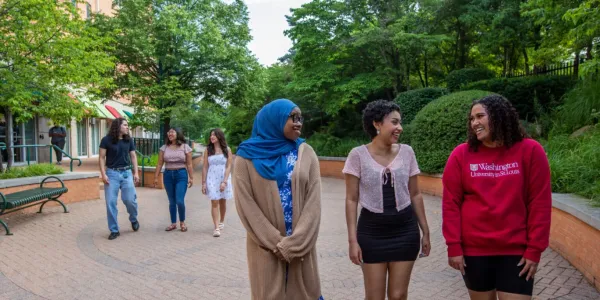Researchers in Arts & Sciences have recently been awarded grants from organizations including NASA and the Research Corporation for Science Advancement.
Kater Murch, associate professor in the Department of Physics, was awarded a National Science Foundation CAREER grant in the amount of $500,000 toward his research on "Heat, work, and information in quantum circuits." Murch has also been named a 2018 Cottrell Scholar by the Research Corporation for Science Advancement. The $100,000 award is for teacher-scholars early in their careers in chemistry, physics, or astronomy, and recognizes innovation in both research and teaching. In his classes, Murch uses video to supplement lectures, an approach known as the "flipped classroom," which he plans to expand to advanced-level courses and labs.
Todd Braver, professor of psychological and brain sciences, has been awarded a five-year, $2.5 million grant from the National Institute of Mental Health to continue his research into mindfulness training. The unique approach for this new phase of his work is studying identical twins.
Yehuda Ben-Shahar, associate professor of biology, was awarded a $770,000 grant from the National Science Foundation for a collaborative research project titled "Molecular mechanisms for signal-receptor functional coupling in pheromonal systems."
Bryce Sadtler, assistant professor in the Department of Chemistry, has received a $614,000 National Science Foundation CAREER grant toward his research on "Mapping the chemical reactivity of metal oxide photocatalysts by correlative single-molecule fluorescence and electron microscopy."
Julie M. Bugg, associate professor of psychological and brain sciences, was awarded $419,000 from the National Institute on Aging toward research on "Memory-based attentional control: A behavioral biomarker for preclinical and early state Alzheimer's Disease?"
Christine Floss, research professor in the Department of Physics, was awarded $255,000 from NASA to undertake a project titled "Identification and analysis of impact craters on Al foils from the Stardust interstellar collector tray."
Ryan Ogliore, assistant professor of physics, received a $147,000 grant from NASA in support of a project titled "Investigating nearby supernovae through analyses of ancient and contemporary stardust."
Elizabeth S. Haswell, associate professor of biology, has been elected as a council delegate for biological sciences for the American Association for the Advancement of Science, the world’s largest general scientific society. AAAS is dedicated to advancing science, engineering, and innovation for the benefit of all.
Mica Jones, a graduate student in archaeology working with Fiona Marshall, James W. and Jean L. Davis Professor in Arts and Sciences in the Department of Anthropology, was awarded a $20,000 Wenner Gren Dissertation Fieldwork Grant in support of research on "Holocene hunter-gatherer variability and ecological reorganization at Namundiri A, Uganda." Jones also received an $8,000 National Science Foundation grant toward his doctoral dissertation on "Hunter-gatherer socioeconomic strategies and climatic variability in eastern Africa, ~20,000-5,000 BP."
Bradley Jones, a graduate student in sociocultural anthropology working with Glenn D. Stone, professor of anthropology and of environmental studies, received a $21,000 grant from the National Science Foundation in support of his doctoral dissertation project titled "A comparative study of skilling institutions in U.S. alternative agriculture."
Lauren Cubellis, a graduate student in sociocultural anthropology working with Rebecca Lester, associate professor in the Department of Anthropology, received a $15,550 Wenner Gren Conference Grant toward convening a meeting on "Care at the nexus of power and practice: Anthropological engagements with caring otherwise."
Mark McDaniel, professor of psychological and brain sciences and co-director of the Center for Integrative Research on Cognition, Learning, and Education (CIRCLE), is one of three leading experts in cognitive and learning sciences appointed as permanent members of a Learning Research Advisory Council formed by Macmillan Learning. The council comprises leading experts in cognitive and learning science who are advising and critiquing the design principles and processes Macmillan Learning is using to develop next-generation learning experiences that deliver better outcomes.
Did we miss something? Let us know.
For assistance with proposal writing, editing, coordination, and other related projects, please contact
Crystal Gammon, grants and science writer in Arts & Sciences.




